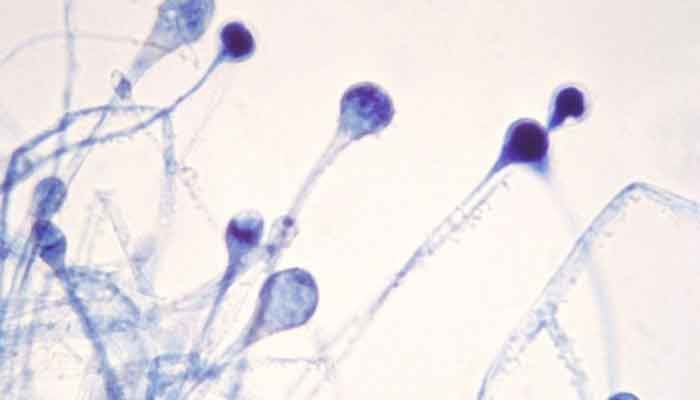
Desk Report
Publish: 25 May 2021, 02:17 pm

Mucor mould is commonly found in soil, plants, manure, and decaying fruits and vegetables. Photo: BBC
As authorities reported the alarming news of black fungus in Bangladesh, the general mass cannot help but worry about its impact since its cases have surged in India adding more suffering to its already shrivelled state riddled with Covid-19 cases.
So, let us look at what exactly is the black fungus, how it spreads, and how can general people combat it?
What is the black fungus?
Even though everyone knows this new rare case of fungal infection as the black fungus, it's also known as Mucormycosis.
Mucormycosis is caused by a group of moulds known as mucormycetes, which can be found in soil and on plants, reports The Guardian.
When moulds get on hospital linens, migrate via ventilation systems, or are transmitted on adhesives, they can be acquired in hospitals – most often by vulnerable transplant patients.
According to experts, the surge may be due to an overuse of some immune-suppressing drugs during the Covid-19 pandemic.
Who are at risk of being infected?
Mucormycosis is found among people who have tested positive for Covid-19 or have recovered from it.
Patients with kidney failure, heart disease, and liver disease are also at a higher risk of infection.
Mucormycosis has a 54 per cent mortality rate, according to the US Centers for Disease Control and Prevention, which varies depending on the patient's health and the body part affected.
Dr Budyal, a senior consultant endocrinologist, Fortis Hospital in India said this infection is more likely to affect people who have a severely weakened immune system, reports The Indian Express.
Diabetologists around the country are warning people about the elevated risk of mucormycosis during Covid-19, advising them to keep their blood sugar levels under control, she added.
Is the black fungus contagious?
The disease is not infectious, which means it cannot be passed from person to person or animal to animal. However, it is transmitted by fungal spores in the air or in the environment, which are almost difficult to prevent.
The underlying cause of the disease in India, according to a Firstpost report, is the unsanitary way of supplying oxygen to patients in many areas, coupled with the indiscriminate use of steroids in the treatment of Covid-19.
What are the symptoms?
Pain and redness around the eyes and nose, a fever, headache, coughing, bloody diarrhoea, black and bloody nasal discharge, pain on one side of the face and in the sinuses, blackish discolouration over the nose, tooth pain, and painful and blurred vision are just a few of the symptoms, according to The Guardian.
How is it prevented and treated?
The only way to avoid Mucormycosis, according to Dr Suresh Kumar, medical director of Lok Nayak Jai Prakash Narayan Hospital, is to keep blood sugar levels under check, use steroids only as directed by doctors, and keep face masks clean. He also advised against the use of dry oxygen, reports The Hindustan Times.
Prof Peter Collignon, a member of the World Health Organization's expert committee on antibiotic resistance and infectious diseases, said that mucormycosis is costly and difficult to treat.
Antifungal medications are offered to patients with mucormycosis, which can be very toxic.
Collignon said, "You almost always need surgery to clean out the source of the infection, which is normally the sinus, and the back of your throat at the back of your nose." "You have to get in there and cut out all of the fungus." The surgery may take place in very sensitive areas, such as the base of your brain."
When handling mud, moss, or manure, the Indian Council of Medical Research and the Union Health Ministry have released an advisory urging people to wear shoes, long pants, long sleeve shirts, and gloves.
People should also maintain personal hygiene, make sure their diabetes is under control if they have it, and medical professionals should stop using immune-suppressing drugs like steroids as soon as they are willing, according to the ministry.
Satyendar Jain, Delhi health minister has urged people not to resort to self-medication.
Source: TBS
Subscribe Shampratik Deshkal Youtube Channel
Topic : Health Black Fungus
© 2024 Shampratik Deshkal All Rights Reserved. Design & Developed By Root Soft Bangladesh